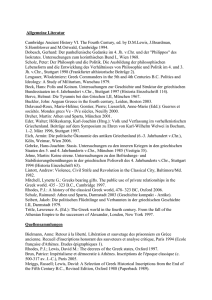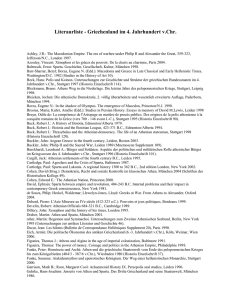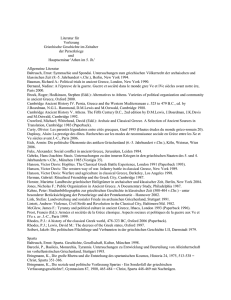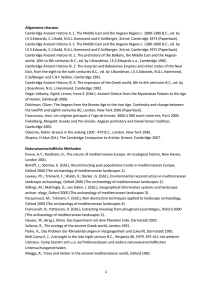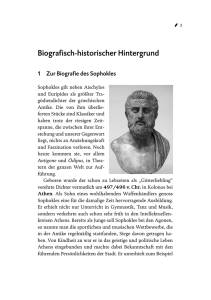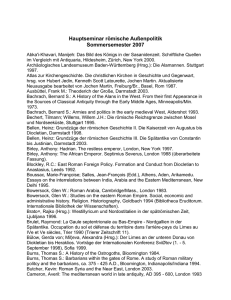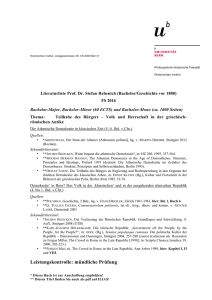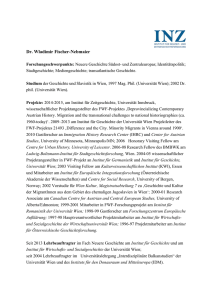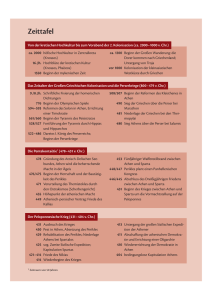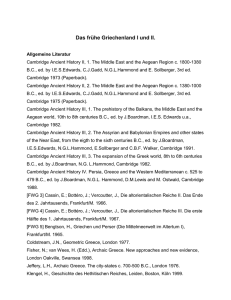Griechische Geschichte im
Werbung
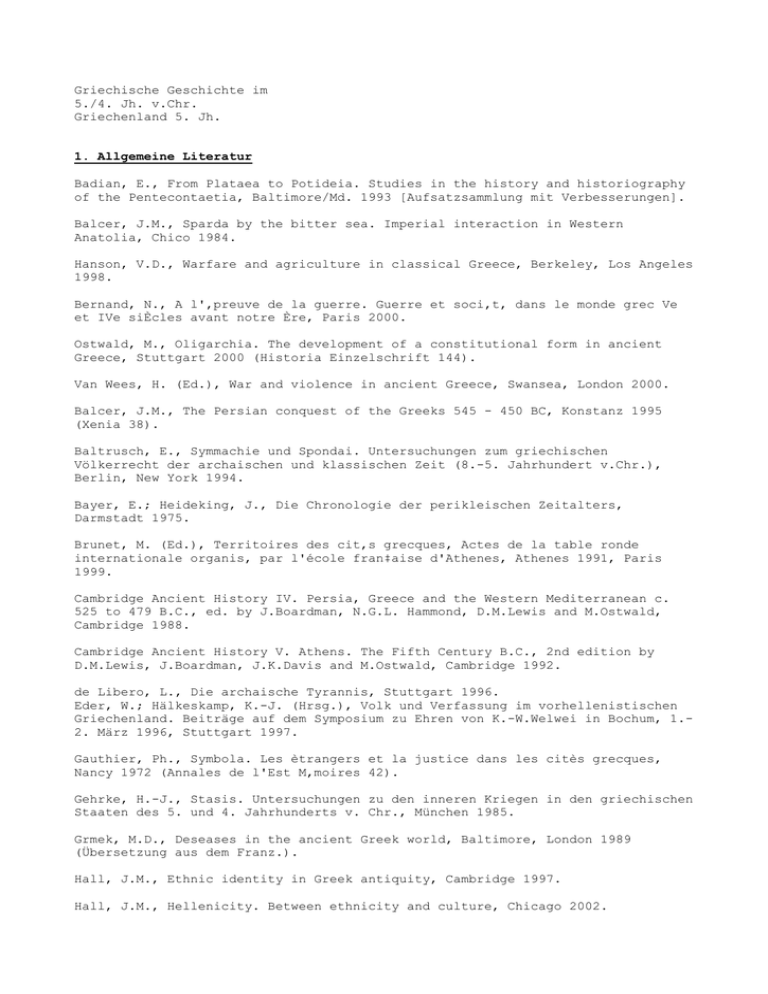
Griechische Geschichte im 5./4. Jh. v.Chr. Griechenland 5. Jh. 1. Allgemeine Literatur Badian, E., From Plataea to Potideia. Studies in the history and historiography of the Pentecontaetia, Baltimore/Md. 1993 [Aufsatzsammlung mit Verbesserungen]. Balcer, J.M., Sparda by the bitter sea. Imperial interaction in Western Anatolia, Chico 1984. Hanson, V.D., Warfare and agriculture in classical Greece, Berkeley, Los Angeles 1998. Bernand, N., A l'‚preuve de la guerre. Guerre et soci‚t‚ dans le monde grec Ve et IVe siÈcles avant notre Ère, Paris 2000. Ostwald, M., Oligarchia. The development of a constitutional form in ancient Greece, Stuttgart 2000 (Historia Einzelschrift 144). Van Wees, H. (Ed.), War and violence in ancient Greece, Swansea, London 2000. Balcer, J.M., The Persian conquest of the Greeks 545 - 450 BC, Konstanz 1995 (Xenia 38). Baltrusch, E., Symmachie und Spondai. Untersuchungen zum griechischen Völkerrecht der archaischen und klassischen Zeit (8.-5. Jahrhundert v.Chr.), Berlin, New York 1994. Bayer, E.; Heideking, J., Die Chronologie der perikleischen Zeitalters, Darmstadt 1975. Brunet, M. (Ed.), Territoires des cit‚s grecques, Actes de la table ronde internationale organis‚ par l'école fran‡aise d'Athenes, Athenes 1991, Paris 1999. Cambridge Ancient History IV. Persia, Greece and the Western Mediterranean c. 525 to 479 B.C., ed. by J.Boardman, N.G.L. Hammond, D.M.Lewis and M.Ostwald, Cambridge 1988. Cambridge Ancient History V. Athens. The Fifth Century B.C., 2nd edition by D.M.Lewis, J.Boardman, J.K.Davis and M.Ostwald, Cambridge 1992. de Libero, L., Die archaische Tyrannis, Stuttgart 1996. Eder, W.; Hälkeskamp, K.-J. (Hrsg.), Volk und Verfassung im vorhellenistischen Griechenland. Beiträge auf dem Symposium zu Ehren von K.-W.Welwei in Bochum, 1.2. März 1996, Stuttgart 1997. Gauthier, Ph., Symbola. Les ètrangers et la justice dans les citès grecques, Nancy 1972 (Annales de l'Est M‚moires 42). Gehrke, H.-J., Stasis. Untersuchungen zu den inneren Kriegen in den griechischen Staaten des 5. und 4. Jahrhunderts v. Chr., München 1985. Grmek, M.D., Deseases in the ancient Greek world, Baltimore, London 1989 (Übersetzung aus dem Franz.). Hall, J.M., Ethnic identity in Greek antiquity, Cambridge 1997. Hall, J.M., Hellenicity. Between ethnicity and culture, Chicago 2002. Gill, Ch.; Postlewaite, N.; Seaford, R. (Edd.), Reciprocity in ancient Greece, Oxford 1998. Hanson, V.D., Die Kriege der griechischen Antike, aus dem Englischen von K.Braun, Berlin 2001. Mitchell, L.G., Greeks bearing gifts. The public use of private relationships in the Greek world. 435 - 323 B.C., Cambridge 1997. Rhodes, P.J.; Lewis, D.M., The decrees of the Greek states, Oxford 1997. Welwei, K.-W., Die griechische Polis. Verfassung und Gesellschaft in archaischer und klassischer Zeit, 2., durchgesehene und erweiterte Auflage, Stuttgart 1998. Hanson, V.D., Hoplites. The Classical Greek Battle Experience, London 1991. Hanson, V.D., The western way of war. Infantry battle in classical Greece, New York 1989. Herman, G., Ritualised friendship and the Greek city, Cambridge 1987. Jones, N.F., Public organization in ancient Greece. A documentary study, Philadelphia 1987. Larsen, J.A.O., Greek federal states. Their institutions and history, Oxford 1968. Lengauer, W., Greek commanders in the 5th and 4th centuries B.C. Politics and ideology: A study of militarism, Warschau 1979. Leschhorn, W., "Gründer der Stadt". Studien zu einem politisch-religiösen Phänomen der griechischen Geschichte, Stuttgart 1984. Lintott, A., Violence, civil strife and revolution in the classical city, London, New York 1982. Littman, R.J., The Greek experiment. Imperialism and social conflict 800-400 BC, London 1974. Mattingly, H.B., The Athenian Empire restored. Epigraphic and historical studies, Ann Arbor/Michigan 1996 [Aufsatzsammlung]. Meiggs, R., The Athenian empire, Oxford 1972. Nilsson, M.P., Geschichte der griechischen Religion I. Bis zur griechischen Weltherrschaft, München 1941. Powell, A., Athens and Sparta. Constructing Greek political and social history from 478 B.C., London 1988. Raaflaub, K., Die Entdeckung der Freiheit. Zur historischen Semantik und Gesellschaftsgeschichte eines politischen Grundbegriffs der Griechen, München 1985. Schuller, W., Griechische Geschichte, München, Wien 1982 u.ä. Sealey, R., A history of the Greek city states ca. 700-338 B.C., Berkeley 1976. Seibert, J., Die politischen Flüchtlinge und Verbannten in der griechischen Geschichte, Darmstadt 1979. Shipley, G., A history of Samos 800-188 B.C., Oxford 1987. Stein-Hälkeskamp, E., Adelskultur und Polisgesellschaft. Studien zum griechischen Adel in archaischer und klassischer Zeit, Stuttgart 1989. Wirth, G. (Hrsg.), Perikles und seine Zeit, Darmstadt 1979 (Literatur). Literatur zu einzelne Staaten Buck, R.J., A history of Boeotia, Edmonton/Alberta 1979. Demand, N.H., Thebes in the fifth century, London 1982. Errington, M., Geschichte Makedoniens. Von den Anfängen bis zum Untergang des Königreiches, München 1986. Funke, S., Aiakidenmythos und epeirotisches Königtum. Der Weg einer hellenistischen Monarchie, Stuttgart 2000. Gehrke, H.-J., Jenseits von Athen und Sparta. Das Dritte Griechenland und seine Staatenwelt, München 1986. Hammond, N.G.L., The Macedonian state. The origins, institutions and history, Oxford 1989. Hammond, N.G.L.; Griffith, G.T., A history of Macedonia II. 550-336 B.C., Oxford 1979. S nchez, P., L'Amphictionie des Pyles et de Delphes. Recherches sur son r“le historique, des origines au IIe siÈcle de notre Ère, Stuttgart 2001 (Historia Einzelschrift 148). Brock, R.; Hodkinson, St. (Edd.), Alternatives to Athens. Varieties of political organization and community in ancient Greece, Oxford 2000. Lefevre, F., L'Amphictionie pyl‚o-delphique. Histoire et institutions, Athen, Paris 1998. Legon, R.P., Megara. The political history of a Greek city-state to 336 B.C., Ithaca/N.Y. 1981. Nielsen, Th.H., Arkadia and its poleis in the archaic and classical periods, Göttingen 2002. Salmon, J.B., Wealthy Corinth. A history of the city to 338 B.C., Oxford 1984. Tomlinson, T.A., Argos and the Argolid, London 1972. McInerney, J., The folds of Parnassos. Land and ethnicity in ancient Phocis, Austin/Texas 1999. Wörrle, M., Untersuchungen zur Verfassungsgeschichte von Argos im 5. Jahrhundert vor Christus, Diss. Erlangen 1964. Quellen Dillery, J., Xenophon and the history of his times, London 1995. Gomme, A.W.; Andrewes, A.; Dover, K.J., A historical commentary on Thucydides, Oxford 1945-1981 (5 Bd.). Hornblower, S., A Commentary on Thucydides I. Books I-III, Oxford 1991. Hornblower, S., A Commentary on Thucydides II. Books IV-V, 24, Oxford 1996. Hornblower, S., Thucydides, London 1987. Stadter, Ph.A., A commentary on Plutarch's Pericles, Chapel Hill/ N.C. 1989. Westlake, H.D., Studies in Thucydides and Greek history, Bristol 1989 (Aufsatzsammlung). Xenophon, Hellenika I-II.3.10, edited by P.Krentz, with an introduction, translation and commentary, Warminster 1989. Xenophon, Hellenika II.3.11-IV.2.8, edited by P.Krentz, with an introduction, translation and commentary, Warminster 1995. 2. Vorgeschichte bis zum 6. Jh. Boardman, J., Hammond, N.G.L. (Edd.), Cambridge Ancient History III,3. The expansion of the Greek world. 8th to 6th centuries B.C. (1982). [Guter Literaturüberblick]. Boardman, J., Kolonien und Handel der Griechen vom späten 9. bis zum 6. Jahrhundert v.Chr., München 1981. Dunbabin, T.J., The Greeks and the Eastern neighbours. Studies in the relations between Greece and the countries of the Near East in the Eigth and Seventh centuries B.C., London 1957 (ND Chicago 1979). Dunbabin, T.J., The Western Greeks. The history of Sicily and South Italy from the foundation of the Greek colonies to 480 B.C., Oxford 1948 (ND Chicago 1979). Ehrhardt, N., Milet und seine Kolonien. Vergleichende Untersuchung der kultischen und politischen Einrichtungen, Frankfurt/M., Bern, New York 1983. Graham, A.J., Colony and mother city in ancient Greece, 2nd enlarged ed. Chicago 1983. Isaac, B., The Greek settlement in Thrace until the Macedonian conquest, Leiden 1986. Roebuck, C., Ionian trade and colonization, New York 1959 (ND. Chicago 1984). 3. Geschichte des persischen Reiches Allgemeine Literatur Briant, P., Histoire de l'empire perse de Cyrus … Alexandre, Paris 1996 (Achaemenid History 10). Brosius, M.; Kuhrt, A. (Edd.), Studies in Persian History. Essays in memory of David M.Lewis, Leiden 1998. Cambridge History of Iran II. The Median and Achaemenian Periods, Cambridge 1985. Dandamaev, M.A., A political history of the Achaemenid Empire, translated into English by W.J.Vogelsang, Leiden, New York 1989. Dani, A.H.; Masson, V.M. (Edd.), History of civilisations of Central Asia I. The dawn of civilization: earliest times to 700 B.C., Paris 1992. Frei, P.; Koch, K., Reichsidee und Reichsorganisation im Perserreich, 2. bearbeitete und erweiterte Aufl. Freiburg/Schweiz und Göttingen 1996. Frye, R.N., The history of ancient Iran, München 1984. Harmatta, J.; Puri, B.N.; Etemadi, G.F. (Edd.), History of civilizations of Central Asia II. The development of sedentary and nomadic civilizations: 700 B.C. to A.D. 250, Paris 1994. Kuhrt, A., The ancient Near East c. 3000 - 330 B.C., London, New York 1995. Sinor, D. (Ed.), The Cambridge History of Early Inner Asia, Cambridge 1990. Walser, G., Hellas und Iran. Studien zu den griechisch-persischen Beziehungen vor Alexander, Darmstadt 1984. Weber, U.; Wiesehöfer, J., Das Reich der Achaimeniden. Eine Bibliographie, Berlin 1996 (Archäologische Mitteilungen aus Iran, Ergänzungsband 15) Wiesehöfer, J., Das antike Persien. Von 550 v.Chr. bis 650 n.Chr., München, Zürich 1994. Geschichte Balcer, J.M., Herodotus & Bistun. Problems in ancient Persian historiography, Stuttgart 1987. Hinz, W., Darius und die Perser. Eine Kulturgeschichte der Achämeniden, BadenBaden 1979. Wiesehöfer, J., Der Aufstand Gaumatas und die Anfänge Dareios' I., Bonn 1978. Balcer, J.M., Persian occupied Thrace (Skudra), Historia 37, 1988, 1-21. Rostowzeff, M.I., Skythien und der Bosporus, Band II. Wiederentdeckte Kapitel und Verwandtes, übersetzt und herausgegeben von H.Heinen, in Verbindung mit G.M.Bongard-Levin und Ju.G.Winogradov, Russische Akademie der Wissenschaften, Moskau, Stuttgart 1993. Verwaltung Briant, P., Rois, tributs et paysans. Etudes sur les formations tributaires du Moyen-Orient ancien, Paris 1982. Briant, P.; Herrenschmidt, Cl. (Edd.), Le tribut dans l'empire perse. Actes de la Table ronde de Paris, 12-13 decembre 1986, Paris 1989. Brosius, M., Women in ancient Persia (559-331 B.C.), Oxford 1996. Chaumont, M.-L., études d'histoire parthe V. La route royale des Parthes de Zeugma … S‚leucie du Tigre d'après l'itin‚raire d'Isidore de Charax, Syria 61, 1984, 63-107. Graf, D.F., The Persian royal road system in Syria-Palestine, TranseuphratÈne 6, 1993, 149-168. Graf, D.F., The Persian Royal Road System, in: Sancisi-Weerdenburg, H.; Kuhrt, A.; Root, M.C. (Edd.), Achaemenid History VIII. Continuity and change, Leiden 1995, 167-189. Hallock, R.T., Persepolis fortification tabletts, Chicago 1969. Hoglund, K.G., Achaemenid imperial administration in Syria-Palestine and the missions of Ezra and Nehemiah, Atlanta/Georgia 1992. Jacobs, B., Die Satrapienverwaltung im Perserreich zur Zeit Darius' III., Wiesbaden 1994. Koch, H., Achämeniden-Studien, Wiesbaden 1993. Koch, H., Verwaltung und Wirtschaft im persischen Kernland zur Zeit der Achämeniden, Wiesbaden 1990. Sekunda, N., Achaemenid settlement in Caria, Lycia and Greater Phrygia, SancisiWeerdenburg, H.; Kuhrt, A. (Edd.), Achaemenid History VI. Asia Minor and Egypt. Old cultures in a new empire, Leiden 1991, 83-143. Sekunda, N., Persian settlement in Hellespontine Phrygia, Kuhrt, A.; SancisiWeerdenburg, H. (Edd.), Achaemenid History III. Method and theory, Leiden 1988, 175-196. Stolper, M.W., Entrepreneurs and empire. The Muras† archive, the Muras† firm and Persian rule in Babylonia, Leiden 1985. Tuplin, Chr., Persian garrisons in Xenophon and other sources, in: Kuhrt, A.; Sancisi-Weerdenburg, H. (Edd.), Achaemenid History III. Method and theory, Leiden 1988, 67-70. Tuplin, Chr., Xenophon and the garrisons of the Achaemenid Empire, Archäologische Mitteilungen aus Iran 20, 1987, 167-245. Vogelsang, W.J., The Rise and Organisation of the Achaemenid Empire. The Eastern Iranian Evidence, Leiden 1992 (Studies in the History of the Ancient Near East 3). Gesellschaft/Wirtschaft Briant, P., Etat et pasteurs au Moyen-Orient ancien, Cambridge, Paris 1982. Briant, P., Ethno-classe dominante et population soumises dans l'empire achéménide: Le cas de l'Egypte, in: Kuhrt, A.; Sancisi-Weerdenburg, H. (Edd.), Achaemenid History III. Method and theory, Leiden 1988, 137-173. Brosius, M., Women in ancient Persia (559-331 B.C.), Oxford 1996. Dandamaev, M.A., Slavery in Babylonia from Nabopalassar to Alexander the Great (626-331 B.C.). Revised edition, translated by V.A.Powell, DeKalb/Illinois 1984. Dandamaev, M.A.; Lukonin, V.G., The cultural and social institutions of ancient Iran (English edition by Ph.L.Kohl with the assistance of D.J.Dadson), Cambridge 1989. Religion Ahn, G., Religiöse Herrscherlegitimation im achämenidischen Iran. Die Voraussetzungen und die Struktur ihrer Argumentation, LiÈge 1992. Boyce, M., A History of Zoroastrianism I. The Early Period, 2nd impression with corrections, Leiden 1989. Boyce, M., A History of Zoroastrianism II. Under the Achaemenians, Leiden 1982. Boyce, M., A History of Zoroastrianism III. Zoroastrianism under Macedonian and Roman Rule, Leiden 1991. Calmeyer, P., Fortuna - Tyche - Khvarnah, JdI 94, 1979, 347-365. Carradine, D.; Price, S. (Edd.), Rituals of Royalty. Power and Ceremonial in Traditional Societies, Cambridge 1987. Gadd, C.J., Ideas of divine rule in the ancient Near East, London 1948 (ND. München 1980). Quaegebeur, J. (Ed.), Ritual and sacrifice in the ancient Near East, Leuven 1994. Root, M.C., The king and kingship in achaemenid art. Essays on the creation of an iconography of empire, Leiden 1979. 4. Der ionische Aufstand und seine Folgen(vgl. auch 1) Alram, M.; Karwiese, St., Dareikos und Siglos. Ein neuer Schatzfund achaimenidischer sigloi aus Kleinasien. Mit einem metrologischen Beitrag von St.Karwiese, in: R.Gyselen (Ed.), Circulation des monnaies, des merchandises et des biens, Leuven 1993 (Res Orientales 5), 23-53. Balcer, J., The East Greeks under Persian rule: A reassesment, in: SancisiWeerdenburg, H.; Kuhrt, A. (Edd.), Achaemenid History VI. Asia Minor and Egypt. Old cultures in a new empire, Leiden 1991, 57-65. Burn, A.R., Persia and the Greeks, in: The Cambridge History of Iran II. The Median and achaemenian periods, Cambridge 1985, 292-391, Literatur 894 ff. Griffiths, A., Democedes of Croton. A Greek doctor at Darius' court, in: Sancisi-Weerdenburg, H.; Kuhrt, A. (Edd.), Achaemenid History II. The Greek Sources, Leiden 1987, 37-51. Kienast, D., Die Auslösung des Ionischen Aufstandes und das Schicksal des Histiaios, Historia 43, 1994, 387-401. Georges, P.B., Persian Ionia under Darius. The revolt reconsidered, Historia 49, 2000, 1-39. Kienast, D., Bemerkungen zum Jonischen Aufstand und zur Rolle des Artaphernes, Historia 51, 2002, 1-31. Lateiner, D., The failure of the Ionian revolt, Historia 31, 1982, 129-160. Mitchell, B.M., Herodotus and Samos, JHS 95, 1975, 75-91. Thiry, S., Aspects g‚opolitiques de l'histoire des Œles ioniennes aux ‚poques classiques et h‚llenistique, Historia 50, 2001, 131-144. Tozzi, P., La rivolta ionica, Pisa 1978. Vickers, M., Interactions between Greeks and Persians, in: Sancisi-Weerdenburg, H.; Kuhrt, A. (Edd.), Achaemenid History IV. Centre and periphery, Leiden 1990, 253-262. Walser, G., Hellas und Iran. Studien zu den griechisch-persischen Beziehungen vor Alexander, Darmstadt 1984 (EdF). Walser, G., Persischer Imperialismus und griechische Freiheit (Zum Verhältnis zwischen Griechen und Persern in frühklassischer Zeit), in: Sancisi Weerdenburg, H.; Kuhrt, A. (Edd.), Achaemenid History II. The Greek Sources, Leiden 1987, 155-165. Walter, U., Herodot und die Ursachen des Ionischen Aufstandes, Historia 42, 1993, 257-278. 5. Die Entwicklung Spartas Cartledge, P., Sparta and Lakonia. A regional history 1300-362 BC, London-Boston 1979. Christ, K. (Hrsg.), Sparta, Darmstadt 1986 (WdF). Clauss, M., Sparta. Eine Einführung in seine Geschichte und Zivilisation, München 1983. Bringmann, K., Die groáe Rhetra und die Entstehung des spartanischen Kosmos, Historia 24, 1975, 513-538 = Christ, Sparta 351-386. Thommen, L., Lakedaimonion politeia. Die Entstehung der spartanischen Verfassung, Stuttgart 1996. Thommen, L., Spartas Umgang mit der Vergangenheit, Historia 49, 2000, 40-53. Cartledge, P., Hoplites and heroes: Sparta's contribution to the technique of ancient warfare, JHS 97, 1977, 11-27 = Christ, Sparta 387-425 und Nachtrag S. 470 (dtsch. Übersetzung). Welwei, K.-W., Die spartanische Phylenordnung im Spiegel der groáen Rhetra und des Tyrtaios, Gymnasium 86, 1979, 178-196 = Christ, Sparta 426-447 mit einem Nachtrag aus dem J. 1983. Bringmann, K., Die soziale und politische Verfassung Spartas - Ein Sonderfall der griechischen Verfassungsgeschichte?, Gymnasium 87, 1980, 465-484 = Christ, Sparta 448-469. Kiechle, F., Lakonien und Sparta. Untersuchungen zur ethnischen Struktur und zur politischen Entwicklung Lakoniens und Spartas bis zum Ende der archaischen Zeit, München 1963. Link, St., Der Kosmos Sparta. Recht und Sitte in klassischer Zeit, Darmstadt 1994. Powell, A. (Ed.), Classical Sparta. Techniques behind her Success, London 1989. Powell, A. (Ed.), The shadow of Sparta, London, New York 1993. Lazenby, J.F., The Spartan army, Warminster 1985. Baltrusch, E., Sparta. Geschichte, Gesellschaft, Kultur, München 1998. Cavanagh, W.G.; Walker, S. (Edd.), Sparta in Laconia, Proceedings of the 19th Brtish Museum Classical Colloquium, London 1998 (British School at Athens Studies 4). Hodkinson, St., Property and wealth in classical Sparta, London 2000. Cartledge, P., Spartan reflections, London, New York 2001. Richer, N., Les éphores. études sur l'histoire et sur l'image de Sparte (VIIIe IIIe siÈcle avant J‚sus-Christ), Paris 1998. Hodkinson, St.; Powell, A. (Edd.), Sparta. New perspectives, Guildford/Surrey 1999. 6. Die Entwicklung Athens bis ca. 480(vgl. auch 1) Allgemeine Literatur Billingmeier, J.-C.; Sutherland-Dusing, A., The origin and function of the naukraroi at Athens. An ethymological and historical explanation, TAPhA 111, 1981, 11-16. Davies, J.K., Athenian propertied families 600-300 B.C., Oxford 1971. Figueira, Th.J., Xanthippos, father of Pericles, and the Prytaneis of the Naukraroi, Historia 35, 1986, 257-279. Lambert, S.D., The Phratries of Attica, Ann Arbor/Michigan 1993. Stahl, M., Aristokraten und Tyrannen im archaischen Athen. Untersuchungen zur Überlieferung, zur Sozialstruktur und zum Entstehen des Staates, Stuttgart 1987. Welwei, K.-W., Athen. Vom neolithischen Siedlungsplatz zur archaischen Groápolis, Darmstadt 1992. Littman, R., Kinship and politics in Athens, 600-400 B.C., New York 1990. Attische Geschichtsschreibung Jacoby, F., Atthis: The local chronicles of ancient Athens, Oxford 1949. Pearson, L., The Local Historians of Attica, o.O. 1942 (ND Chico/Cal. 1981). Androtion: Harding, Ph., Androtion and the Atthis. The fragments translated with introduction and commentary, Oxford 1994. Rhodes, P.J., A commentary on the Aristotelian Athenaion Politeia, Oxford 1981. Grundlegendes Werk mit reichen Literaturangaben. Mit Ergänzungen versehene Ausgabe 1993. Keaney, J.J., The Composition of Aristotle's Athenaion Politeia. Observation and Explanation, New York, Oxford 1992. Solon Stanley, Ph.V., The economic reforms of Solon, St. Katharinen 1999 (Pharos 11). Demont, P., La cit‚ grecque archa‹que et classique et l'id‚al de tranquilit‚, Paris 1990. Gallant, T.W., Agricultural systems, land tenure, and the reforms of Solon, ABSA 77, 1982, 111-124. Chiasson, C., The Herodotean Solon, GRBS 27, 1986, 249-262. Stanton, G.R.; Ellis, J.R., Factional conflicts and Solon's reforms, Phoenix 22, 1968, 95-110. Rihll, T., Lawgivers and tyrants (Solon Frg. 9-11 West), CQ 39, 1989, 277-286. Ruschenbusch, E., Solonos Nomoi. Die Fragmente des solonischen Gesetzeswerkes mit einer Text- und Überlieferungsgeschichte, Wiesbaden 1966 (HistoriaEinzelschrift 9). Robertson, N., Solon's Axones and Kyrbeis, and the sixth-century background, Historia 35, 1986, 147-176. Horsmann, G., Athens Weg zur eigenen Währung. Der Zusammenhang der metrologischen Reform Solons mit der timokratischen, Historia 49, 2000, 259-277. Lambert, S.D., Herodotus, the Cylonian conspiracy and PRUTANIES TXN NAUKRARXN, Historia 35, 1986, 105-112. Peisistratos und seine Familie Bicknell, P., Athenian politics and genealogy: some pendants, Historia 23, 1974, 146-163. Bicknell, P., The exiles of the Alkmeonidai during the Peisistratid tyranny, Historia 19, 1970, 129-131. Boardman, J., Herakles, Peisistratos and Eleusis, JHS 95, 1975, 1-12. Boardman, J., Herakles, Peisistratos and sons, RA 65, 1972, 57-72. Cadoux, T.J., The Athenian archons from Kreon to Hypsichides, JHS 68, 1948, 70123. Develin, R., Herodotus and the Alcmaeonids, in: J.W.Eadie, J.Ober (Edd.), The craft of the ancient historian. Essays in honor of Ch.G.Starr, Ann Arbor 1985, 125-140. Diesner, H.-J., Peisistratidenexkurs and Peisistratidenbild bei Thukydides, Historia 8, 1959, 12-22. Fornara, C., Hellanicus and Alkmaeonid tradition, Historia 17, 1968, 381-384. French, A., The party of Peisistratos, G & R 6, 1959, 46-57. Frost, F., Peisistratos, the cults, and the unification, AncW 21, 1990, 3-9. Frost, F., Toward a history of Peisistratid Athens, in: J.W.Eadie, J.Ober (Edd.), The craft of the ancient historian. Essays in honor of Ch.G.Starr, Ann Arbor 1985, 57-78. Hammond, N.G.L., The Philaids in the Chersonese, CQ 6, 1956, 113-129. Holladay, J., The followers of Peisistratos, G & R 24, 1977, 40-56. Hopper, R.J., 'Plain', 'shore', and 'hill' in early Athens, ABSA 56, 1961, 186219. Kinzl, K., Betrachtungen zur älteren Tyrannis, AJAH 4, 1979, 23-45. Kinzl, K., Regionalism in classical Athens? Or anachronism in Herodotos (1.59.3)?, AHB 3, 1989, 5-9. Kolb, F., Die Bau-, Religions- und Kulturpolitik der Peisistratiden, JDAI 92, 1977, 99-138. Lavelle, B.M., Herodotus, Skythian archers and the ®MD49¯doryphoroi®MD1¯ of the Peisistratids, Klio 74, 1992, 78-97. Lavelle, B.M., Koisyra and Megakles, the son of Hippokrates, GRBS 30, 1989, 503513. Lavelle, B.M., The Peisistratids and the mines of Thrace, GRBS 33, 1993, 5-23. Lavelle, B.M., The Sorrow and the Pity. A prolegomenon to a history of Athens under the Peisistratids, c. 560-510 B.C., Stuttgart 1993. Lewis, D.M., The tyranny of the Pisistratidae, CAH IV®MD65¯2®MD1¯, 1988, 287302. McGregor, M.F.; Eliot, C.W.J., Kleisthenes, eponymous archon, 525/4 B.C., Phoenix 14, 1960, 27-35. Neils, J., Goddess and Polis. The panathenaic festival in ancient Athens, Lawrenceville/N.J. 1992. Rhodes, P.J., Peisistratid chronology again, Phoenix 30, 1976, 219-233. Robertson, N., The origin of the Panathenaea, RhM 128, 1985, 231-295. Sancisi-Weerdenburg, H. (Ed.), Peisistratos and the tyranny. A reappraisal of the evidence, Amsterdam 2000. Scanlon, T., Thucydides and tyranny, CSCA 6, 1987, 286-301. Walters, K.R., Geography and kinship as political infrastructures in archaic Athens, Florilegium 4, 1982, 1-31. Kleisthenes Parker, R., Cleomenes on the Acropolis. An inaugural lecture delivered before the University of Oxford on 12 May 1997, Oxford 1998. Berthold, R.M., The Athenian embassies to Sardis and Cleomenes' invasion of Attica, Historia 51, 2002, 259-267. Anderson, G., Alkmeonid 'homelands', political exile, and the unification of Attica, Historia 49, 2000, 387-412. Develin, B.; Kilmer, M., What Kleisthenes did, Historia 46, 1997, 1-17. Figueira, Th.J., Xanthippos, Father of Pericles, and the Prytaneis of the Naukraroi, Historia 35, 1986, 257-279. Fornara, C.W., The Athenian board of generals from 501 to 404, Wiesbaden 1971. Kienast, D., Die innenpolitische Entwicklung Athens im 6. Jh. und die Reformen von 508, HZ 200, 1965, 265-283. Kinzl, K.H., Demokratia. Studie zur Frühgeschichte des Begriffs, Gymnasium 85, 1978, 117-127 u. 312-326. Kluwe, E., Bemerkungen zu den Diskussionen über die drei 'Parteien' in Attika zur Zeit der Machtergreifung des Peisistratos, Klio 54, 1972, 101-124. Kron, U., Die zehn attischen Phylenheroen, Geschichte, Mythos, Kult und Darstellungen, Athenische Mitteilungen Beiheft 5, Berlin 1976. Lavelle, B.M., A note on the first three victims of ostracism (Athenaion Politeia 22.4). CPh 83, 1988, 131-135. Lewis, D.M., Cleisthenes and Attica, Historia 12, 1963, 22-40. Ostwald, M., Autonomia. Its genesis and early history, Chico/ Cal. 1982. Siewert, P., Die Trittyen Attikas und die Heeresreform des Kleisthenes, München 1982. Thomsen, R., The origin of ostracism, Kopenhagen 1972. Traill, J.S., The political organisation of Attica. A study of the demes, trittyes, and phylai, and their representation in the Athenian council, Princeton 1975. 7. Der Konflikt zwischen Griechen und Persern(bis zum J. 479) Balcer, J.M., A prosopographical study of the ancient Persians royal and noble, c. 550-450 B.C., Lewiston/N.Y., Queenston/Ont. 1993. Balcer, J.M., Persian occupied Thrace (Skudra), Historia 37, 1988, 1-21. Balcer, J.M., The Persian Wars against Greece. A Reassessment, Historia 38, 1989, 127-143. Boardman, J.; Hammond, N.G.L.; Lewis, D.M.; Ostwald, M. (Edd.), The Cambridge Ancient History IV®MDSU¯2®MDNM¯. Persia, Greece and the Western Mediterranean c. 525 to 479 B.C., Cambridge 1988 [Literatur]. Brunt, P.A., The Hellenic League against Persia, Historia 2, 1952/53, 135-163. Burn, A.R., Persia and the Greeks. The defence of the West, c. 546-478 B.C., 2nd ed. by D.M.Lewis with a postscript London 1984 (1st ed. 1962). Gillis, D., Collaboration with the Persians, Wiesbaden 1979 (HistoriaEinzelschrift 34). Green, P., Xerxes at Salamis, New York, Washington 1970. Hammond, N.G.L., The narrative of Herodotus VII and the decree of Themistocles at Troezen, JHS 102, 1982, 75-93. Hammond, N.G.L.; Roseman, L.J., The construction of Xerxes' bridge over the Hellespont, JHS 106, 1996, 88-107. Miller, M.C., Athens and Persia in the fifth century B.C., a study in cultural receptivity, Cambridge 1997. Gorman, V.B., Miletos, the ornament of Ionia. A history of the city to 400 B.C.E., Ann Arbor 2001. Hörhager, H., Zu den Flottenoperationen am Kap Artemision, Chiron 3, 1973, 4359. Jameson, M.H., A decree of Themistokles from Troizen, Hesperia 29, 1960, 198223. Lazenby, J.F., The defence of Greece 490-479 B.C., Warminster 1993. Lindenlauf, A., Der Perserschutt der Athener Akropolis, in: Hoepfner, W. (Hrsg.), Kult und Kultbauten auf der Akropolis. Internationales Symposion vom 7. bis 9. Juli 1995 in Berlin, Berlin 1997, 46-115. Morrison, J.S.; Coates, J.F., The Athenian trireme. The history and reconstruction of an ancient Greek warship, Cambridge 1986. Papastavrou, J., Themistokles. Die Geschichte eines Titanen und seiner Zeit, Darmstadt 1978. Tarn, W.W., The fleet of Xerxes, JHS 28, 1908, 202-233. 8. Die Gründung des delisch-attischen Seebundes Balcer, J.M., Sparda by the Bitter Sea. Imperial Interaction in Western Anatolia, Chico/Cal. 1984 (Brown Judaic Studies 52). Balcer, J.M., The liberation of Ionia: 478 B.C., Historia 46, 1997, 373-377. Hammond, N.G.L., The origins and the nature of the Athenian alliance of 478/7 B.C., JHS 87, 1967, 41-61. Jackson, A.H., The original purpose of the Delian League, Historia 18, 1969, 1216. Larsen, J.A.O., The constitution and original purpose of the Delian League, HSCPh 51, 1940, 175-213. Meyer, H.D., Vorgeschichte und Gründung des delisch-attischen Seebundes, Historia 12, 1963, 405-446. Petzold, K.-E., Die Gründung des Delisch-Attischen Seebundes: Element einer imperialistischen Politik Athens, Historia 43, 1994, 1-31. Petzold, K.-E., Die Gründung des Delisch-Attischen Seebundes: Element einer imperialistischen Politik Athens, Historia 42, 1993, 418-443. Rawlings III, H., Thucydides and the purpose of the Delian League, Phoenix 31, 1977, 1-8. Schäfer, H., Die attische Symmachie im zweiten Jahrzehnt ihres Bestehens, Hermes 71, 1936, 129-150 = Probleme der Alten Geschichte, Göttingen 1963, 11-32. Seager, R., The origin of the Delian League, in: Ancient Society and Institutions (FS. V. Ehrenberg), Oxford 1966, 233-255. Steinbrecher, M., Der Delisch-attische Seebund und die athenisch-spartanischen Beziehungen in der Kimonischen Ära (ca. 478/7-462/1), Stuttgart 1985. Woodhead, A.G., The institution of the Hellenotamiae, JHS 69, 1959, 149-152. 9. Ausdehnung und Konflikt mit Sparta Badian, E., The peace of Callias, JHS 107, 1987, 1-38 = From Plataea to Potidaea. Studies in the history and historiography of the Pentecontaetia, Baltimore, London 1993, 1-72. Badian, E., Toward a chronology of the Pentecontaetia down to the renewal of the Peace of Callias, in: From Plataea to Potidaea. Studies in the history and historiography of the Pentecontaetia, Baltimore, London 1993, 73-107. Carawan, E., Eisangelia and Euthyna. The trials of Miltiades, Themistocles, and Cimon, GRBS 28, 1987, 167-208. Dreher, M., Athen und Sparta, München 2001. Carawan, E.M., Thucydides and Stesimbrotus on the exile of Themistocles, Historia 38, 1989, 144-161. Cole, J.R., Cimon's dismissal, Ephialtes' revolution and the Peloponnesian wars, GRBS 15, 1974, 369-385. Demand, N.H., Thebes in the Fifth Century. Heracles Resurgens, London 1982. Forrest, W.G., Themistocles and Argos, CQ 10, 1960, 221-241. Fowler, R.L., Herodotos and his contemporaries, JHS 116, 1996, 62-87. Kiechle, F., Athens Politik nach der Abwehr der Perser, HZ 204, 1967, 265-304. Meister, K., Die Ungeschichtlichkeit des Kalliasfriedens und deren historischen Folgen, Wiesbaden 1982. Noethlichs, K.L., Bestechung, Bestechlichkeit und die Rolle des Geldes in der spartanischen Auáen- und Innenpolitik vom 7.-2. Jh. v.Chr., Historia 36, 1987, 129-170. Papastavrou, J., Themistokles. Die Geschichte eines Titanen und seiner Zeit, Darmstadt 1978. Powell, A., Athens and Sparta. Constructing Greek political and social history from 478 B.C., London 1988. Schumacher, L., Themistokles und Pausanias, Die Katastrophe der Sieger, Gymnasium 94, 1987, 218-246. Toye, D.L., Dionysius of Halicarnassus on the first Greek historians, AJPh 116, 1995, 279-302. 10. Die innere Entwicklung Athens Bleicken, J., Die athenische Demokratie, 2. völlig überarbeitete und wesentlich erweiterte Auflage, Paderborn, München 1994. Boedeker, D.; Raaflaub, K.A., Democracy, empire and the arts in fifth-century Athens, Cambridge/Mass., London 1998. Boegehold, A.L.; Scafuro, A.C. (Edd.), Athenian identity and civic ideology, Baltimore/Maryland, London 1994. Calame, C., Th‚s‚e et l'imaginaire ath‚nien. L‚gende et culte en GrÈce antique, Lausanne 1996. Cohen, B. (Ed.), Not the classical ideal. Athens and the construction of the other in Greek art, Leiden, Boston, Köln 2000. Cartledge, P.; Millett, P.; Todd, St. (Edd.), Nomos. Essays in Athenian law, politics and society, Cambridge 1990. Cawkwell, G.L., Nomophylakia and the areopagus, JHS 108, 1988, 1-12. Develin, R., Athenian officials 684-321 B.C., Cambridge 1989. Ehrenberg, V., Aristophanes und das Volk von Athen. Eine Soziologie der altattischen Komödie, Zürich 1968. Farrar, C., The origins of democratic thinking. The invention of politics in classical Athens, Cambridge 1988. Gabrielsen, V., Financing the Athenian fleet. Public taxation and social relations, Baltimore, London 1994. Goldhill, S.D., The Great Dionysia and civic ideology, JHS 107, 1987, 58-76. Gomme, A.W., The old oligarch, in: More essays in Greek history and literature, Oxford 1962, 38-69. Guettel Cole, S., Oath ritual and the male community at Athens, in: J.Ober, Ch. Hedrick (Edd.), D®MD2¯·®MD1¯mokratia. A conversation on democracies, ancient and modern, Princeton/N.J. 1996, 227-248. Hansen, M.H., The Athenian ecclesia I. A collection of articles 1976-83, Kopenhagen 1983. Hansen, M.H., The Athenian ecclesia II. A collection of articles 1983-89, Kopenhagen 1989. Hanson, V.D., Hoplites into democrats. The changing ideology of Athenian infantry, in: J.Ober, Ch.Hedrick (Edd.), Demokratia. A conversation on democracies, ancient and modern, Princeton/N.J. 1996, 289-312. Klein, R., Die innenpolitische Gegnerschaft gegen Perikles, in: Wirth, Perikles 494-533. Lauffer, S., Die Bergwerkssklaven von Laureion, 2. durchgesehene und erweiterte Auflage Wiesbaden 1979. Manville, Ph.B., The origins of citizenship in ancient Athens, Princeton/N.J. 1990. Martin, J., Von Kleisthenes zu Ephialtes. Zur Entstehung der athenischen Demokratie, Chiron 4, 1974, 5-42. Meier, Chr., Die politische Kunst der griechischen Tragödie, München 1988. Ober, J., Mass and elite in democratic Athens. Rhetoric, ideology, and the power of the people, Princeton 1989. Ostwald, M., From popular sovereignty to the sovereignty of law. Law, society and politics in Fifth-Century Athens, Berkeley 1986. Ostwald, M., Nomos and the Beginnings of the Athenian Democracy, Oxford 1969. Patterson, C., Pericles' citizenship law of 451-50 B.C., New York 1981. Phillips, D.J., Observations on some ostraka from the Athenian agora, ZPE 83, 1990, 123-148. Podlecki, A.J., The life of Themistocles. A critical survey of the literary and archaeological evidence, Montreal, London 1975. Raubitschek, A.E., Theopompus on Thucydides the son of Melesias, Phoenix 14, 1960, 81-95. Rhodes, P.J., A commentary on the Aristotelian Athenaion Politeia, Oxford 1981. Rhodes, P.J., The Athenian Boule, Oxford 1972. Rich, J.; Shipley, G. (Edd.), War and Society in the Greek world, London, New York 1993. Roller, D.W., Who murdered Ephialtes?, Historia 38, 1989, 257-266. Ruschenbusch, E., Athenische Innenpolitik im 5. Jahrhundert v. Chr. Ideologie oder Pragmatismus?, Bamberg 1979. Samons, L.J., Empire of the owl. Athenian imperial finance, Stuttgart 2000 (Historia Einzelschrift 142). Sealey, R., The Athenian courts for homicide, CPh 78, 1983, 275-296. Strauss, B.S., The Athenian trireme, school of democracy, in: J.Ober, Ch.Hedrick (Edd.), D®MD2¯·®MD1¯mokratia. A conversation on democracies, ancient and modern, Princeton/N.J. 1996, 313-325. Thomsen, R., Eisphora. A study of direct taxation in ancient Athens, Kopenhagen 1964. Wallace, R.W., The Areopagos council to 307 B.C., Baltimore 1985. Walters, K.R., Perikles' citizenship law, ClAnt 2, 1983, 314-336. Welwei, K.-W., Das klassische Athen. Demokratie und Machtpolitik im 5. und 4. Jahrhundert, Darmstadt 1999. Welwei, K.-W., Unfreie im antiken Kriegsdienst. I: Athen und Sparta, Wiesbaden 1974. Willemsen, F.; Brenne, St., Verzeichnis der Kerameikos-Ostraka, MDAI(A) 106, 1991, 147-156. Williams, G.M.E., Athenian politics 508/07 - 480 B.C. A reapraisal, Athenaeum 60, 1982, 538 ff. 11. Der 1. peloponnesische Krieg Amit, M., The Boeotian confederation during the Pentekontaetia, RSA 1, 1971, 4964. Badian, E.; Buckler, J., The wrong Salamis?, RhM 118, 1975, 226-239. Badian, E., The peace of Callias, in: From Plataea to Potidaea. Studies in the history and historiography of the Pentecontaetia, Baltimore, London 1993, 1-72. Bosworth, A.B., The congress decree: another hypothesis, Historia 20, 1971, 600616. Bowra, C.M., The epigramm on the fallen of Coronea, CQ 32, 1938, 80-88. Bradeen, D.W., The Athenian casualty lists, CQ 63, 1969, 145-159. Buck, R.J., The Athenian domination of Boeotia, CPh 65, 1970, 217-227. Chambers, M.H.; Gallucci, R.; Spanos, P., Athen's alliance with Egesta in the year of Antiphon, ZPE 83, 1990, 38-63. Gehrke, H.G., Stasis. Untersuchungen zu den inneren Kriegen in den griechischen Staaten des 5. und 4. Jahrhunderts v.Chr., München 1985. Holladay, A.J., Sparta's role in the first Peloponnesian War, JHS 97, 1977, 5463. Jeffrey, L.H., The battle of Oinoe in the Stoa Poikile. A problem in Greek art and history, ABSA 60, 1965, 41-57. Legon, R.P., Megara. The political history of a Greek city-state to 336 B.C., Ithaca/N.Y. 1981. Libourel, J.M., The Athenian desaster in Egypt, AJPh 97, 1971, 605-615. Meister, K., Die Ungeschichtlichkeit des Kalliasfriedens und deren historische Folgen, Wiesbaden 1982. Merritt, B.D., Athens and the Amphictionic League, AJPh 75, 1954, 369-376. Philippides, M., King Pleistoanax and the Spartan invasion of Attica in 446 B.C., AncW 11, 1985, 33-41. Pritchett, W.K., The transfer of the Delian treasury, Historia 18, 1969, 17-21. Robinson, E.W., The first democracies. Early popular government outside Athens, Stuttgart 1997 (Historia Einzelschrift 107). Roux, G., L'amphictionie, Delphes et le temple d'Apollon au IVe siÈcle, Lyon, Paris 1979. Scharf, J., Die erste ägyptische Expedition der Athener. Ein Beitrag zur Pentekontaetie, Historia 3, 1954/55, 308-325. Seager, R.J., The congress decree: some doubts and a hypothesis, Historia 18, 1969, 129-141. Vickers, M., Fifth century chronology and the coinage decree, JHS 116, 1996, 171-174. Wickert, U., Der Peloponnesische Bund von seiner Entstehung bis zum Ende des Archidamischen Krieges, Diss. Erlangen 1959. Zeilhofer, G., Sparta, Delphoi und die Amphiktyonen im 5. Jahrhundert vor Christus, Diss. Erlangen 1959. 12. Athens Herrschaft im Seebund Amit, M., Athens and the sea. A study in Athenian sea power, Brüssel 1965. Balcer, J., Imperial magistrates in the Athenian Empire, Historia 25, 1976, 257287. Balcer, J., Separatism and anti-separatism in the Athenian Empire (478-433 B.C.), Historia 23, 1974, 21-39. Balcer, J., The Athenian episkopos and the Achaemenid 'King's Eye', AJPh 98, 1977, 252-263. Balcer, J.M., The Athenian regulations for Chalkis. Studies in Athenian imperial law, Wiesbaden 1978. Barron, J.P., Religious propaganda of the Delian League, JHS 84, 1964, 35-48. Blackman, D., The Athenian navy and allied naval contributions in the Pentekontaetia, GRBS 10, 1969, 179-216. de Ste.Croix, G.E.M., Jurisdiction in the Athenian Empire, CQ 55, 1961, 94-112 u. 268-280. de Ste.Croix, G.E.M., The character of the Athenian Empire, Historia 3, 1954/55, 1-41. Eddy, S.K., Epiphora in the Tribute Quota Lists, AJPh 89, 1968, 129-143. Erxleben, E., Das Münzgesetz des delisch-attischen Seebundes, APF 19, 1969, 91139; 20, 1970, 66-132; 21, 1971, 145-162. French, A., The tribute of the allies, Historia 21, 1972, 1-20. Mattingly, H.B., Athenian imperialism and the foundation of Brea, CQ 60, 1966, 172-192 = The Athenian Empire restored 117-146. Mattingly, H.B., Athens and Aigina, Historia 16, 1967, 1-5. Mattingly, H.B., Athens and Euboea, JHS 124-132 = The Athenian Empire restored 53-67. Mattingly, H.B., The Athenian coinage decree, Historia 10, 1961, 148-188 = The Athenian Empire restored 5-52. Mattingly, H.B., The Athenian Empire restored. Epigraphic and historical studies, Ann Arbor/Michigan 1996. Mattingly, H.B., The growth of Athenian imperialism, Historia 12, 1963, 257-273 = The Athenian Empire restored 87-106. Meiggs, R., The Athenian empire, Oxford 1972. Meyer, H.D., Abfall und Bestrafung von Bündnern im delisch-attischen Seebund, HZ 191, 1961, 497-509. Nease, A.S., Garrisons in the Athenian Empire, Phoenix 3, 1949, 102-111. Nesselhauf, H., Untersuchungen zur Geschichte der delisch-attischen Symmachie, Leipzig 1933 (ND. Aalen 1963). Quinn, T.J., Athens and Samos, Lesbos and Chios, Manchester 1981. Raptou, E., AthÈnes et Chypre … l'‚poque perse (VI-IV s. av.J.-C.). Histoire et donn‚es arch‚ologiques, Lyon 1999. Robinson, E.W., The first democracies. Early popular government outside Athens, Stuttgart 1997 (Historia Einzelschrift 107). Ruschenbusch, E., Zur Zahl der Tributbezirke des delischen Seebundes und zur Datierung des Kleiniasdekrets und des Münzdekrets, ZPE 26, 1977, 211-215. Schäfer, H., Beiträge zur Geschichte der attischen Symmachie, Hermes 74, 1939, 225-264 = Probleme der Alten Geschichte, Göttingen 1963, 41-81. Schuller, W., Die Herrschaft der Athener im ersten attischen Seebund, Berlin/New York 1974. Schuller, W., Die Stadt als Tyrann, Konstanz 1978. Stroud, R.S., An Athenian law on silver coinage, Hesperia 43, 1974, 157-188. Walbank, M.B., Athenian proxenies of the fifth century B.C., Toronto, Sarasota 1978. 13. Athens Politik nach 445. Innenpolitik Adkins, A.W.H., Polypragmosyne and minding one's own business. A study in Greek social and political values, CPh 71, 1976, 301-327. Allen, D.S., The World of Prometheus. The politics of punishing in democratic Athens, Princeton/N.J. 2000. Ameling, W., Komödie und Politik zwischen Kratinos und Aristophanes. Das Beispiel Perikles, Quaderni Catanesi di studi classice e medievali 3, 1981, 383424. Andrews, A., The opposition to Pericles, JHS 98, 1978, 1-8. Balot, Ryan K., Greed and injustice in classical Athens, Princeton 2001. Bicknell, P.J., Axiochus Alkibiadou, Aspasia and Aspasios, AC 51, 1982, 240-250. Bicknell, P.J., Themistocles, Phrynichos, Aischylos, Ephialtes and Pericles. Political dimensions of Attic tragedy, AH 19, 1989, 120-130. Boersma, J.S., Athenian building policy from 501 to 405/4 B.C., Groningen 1970. Buchanan, J.J., Theorika, Locust Valley/N.Y. 1962. Carey, Ch., Trials from Classical Athens, London, New York 1997. Christ, M.R., The litigious Athenian, Baltimore, London 1998. Cohen, D., The prosecution of impiety in Athenian law, ZRGRom 105, 1988, 695701. Cohen, E.E., Athenian finance. Maritime and landed yields, ClAnt 8, 1989, 207223. Cohen, Ed.E., The Athenian Nation, Princeton 2000. Connor, W.R., The new politicians of fifth-century Athens, Princeton 1971. Davison, J.A., Protagoras, Democritus and Anaxagoras, CQ 47, 1953, 33-45. Derenne, E., Les procès d'impi‚t‚ intent‚s au philosophes … Athènes au Vme et au IVme siècles avant J.-C., Lüttich 1930. Dobrow, G.W. (Ed.), The city as comedy. Society and representation in Athenian drama, Chapel Hill, London 1997. MacDowell, D.M., Aristophanes and Athens. An introduction to the plays, Oxford 1995. Spielvogel, J., Wirtschaft und Geld bei Aristophanes. Untersuchungen zu den ökonomischen Bedingungen in Athen im Übergang vom 5. zum 4. Jh. v.Chr., Frankfurt/M. 2001. Vickers, M., Pericles on stage. Political comedy in Aristophanes' early plays, Austin/Texas 1997. Wilkins, J.; Harvey, D. (Edd.), The rivals of Aristophanes. Studies in Athenian Old Comedy, Oxford 2000. Leppin, H., Thukydides und die Verfassung der Polis. Ein Beitrag zur politischen Ideengeschichte des 5. Jahrhundert v.Chr., Berlin 1999 (Klio Beihefte Neue Folge 1). Eddy, S.K., Athen's peacetime navy in the age of Pericles, GRBS 9, 1968, 65-73. Ehrenberg, V., Aristophanes und das Volk von Athen. Eine Soziologie der altattischen Komödie, Zürich 1968. Euben, J.P., Corrupting youth. Political education, democratic culture, and political theory, Princeton/N.J. 1997. Fabert, J.-P., L'acropole d'AthÈnes, rituel politique et ‚thoque d'une cit‚, EIE 6, 21-24, 1987, 81-127. Fehr, B., Zur religionspolitischen Funktion der Athena Parthenos im Rahmen des delisch-attischen Seebundes, Hephaistos 1, 1979, 71-91; 2, 1980, 113-125; 3, 1981, 55-93. Fornara, C.W., On the chronology of the Samian War, JHS 99, 1979, 7-19. French, A., The growth of the Athenian economy, London 1964. Frost, F.J., Pericles, Thucydides, Sohn of Milesias, and Athenian politics before the war, Historia 13, 1964, 385-399 = Wirth, Perikles 271-289. Funke, P., Athen in klassischer Zeit, München 1999. Giovannini, A., Le Parth‚non, le tr‚sor d'Ath‚na et le tribut des alli‚s, Historia 39, 1990, 129-148. Hamel, D., Athenian Generals. Military Authority in the Classic period, Leiden, Boston, Köln 1998. Hansen, M.H., Initiative und Entscheidung. Überlegungen zur Gewaltenteilung im Athen des 4. Jahrhunderts, Konstanz 1983 (Xenia 6). Hansen, M.H., Was Athens a democracy? Popular rule, liberty and equality in ancient and modern political thought, Kopenhagen 1989. Henry, A.S., Honours and privileges in Athenian decrees. Hildesheim 1983. Hesk, J., Deception and democracy in classical Athens, Cambridge 2001. Hose, M., Kratinos und der Bau des perikleischen Odeions, Philologus 137, 1993, 3-11. Jones, A.H.M., Athenian democracy, Oxford 1957 (Paperback 1977). Jones, N.F., The associations of classical Athens. The response to democracy, New York, Oxford 1999. Jordan, B., The Athenian navy in the classical period, Berkeley, Los Angeles 1975. Klein, R., Die innenpolitische Gegnerschaft gegen Perikles, in: Wirth, Perikles 494-533. Krentz, P., The ostracism of Thoukydides, Son of Melesias, Historia 33, 1984, 499-504. Kurke, L., The politics of ®MD4¯Òbrosång®MD1¯ in archaic Greece, CA 11, 1992, 91-120. Lehmann, G.A., Oligarchische Herrschaft im klassischen Athen. Zu den Krisen und Katastrophen der attischen Demokratie im 5. und 4. Jahrhundert v.Chr., Opladen 1997 (Rheinisch-Westfälische Akademie der Wissenschaften G 346). Mansfeld, J., The chronology of Anaxagoras' Athenian period and the date of his trial. I: The length and dating of the Athenian period, Mnemosyne IV 32, 1979, 36-69. II: The plot against Pericles and his associates, Mnemosyne IV 33, 1980, 17-95. Mansfeld, J., The chronology of Anaxagoras' Athenian period and the date of his trial. I: The length and dating of the Athenian period, Mnemosyne IV 32, 1979, 36-69. II: The plot against Pericles and his associates, Mnemosyne IV 33, 1980, 17-95. Marasco, G., I processi d'impiet 113-131. nella democrazia ateniense, A & R 21, 1976, Markle, M.M., Jury pay and assembly pay at Athens, HPTh 6, 1985, 265-297. Markle, M.M., Participation of farmers in Athenian juries and assemblies, AncSoc 21, 1990, 149-165. Meier, Ch., Athen. Ein Neubeginn der Weltgeschichte, Berlin 1994. Meister, K., Damon, der politische Berater des Perikles, RSA 3, 1973, 29-45. Meister, K., Stesimbrotos' Schrift über die athenischen Staatsmänner und ihre historische Bedeutung (FGrHist 107 F 1-11), Historia 27, 1978, 274-294. Meyer, H.D., Thukydides Melesiou und die oligarchische Opposition gegen Perikles, Historia 16, 1967, 141-165. Morrison, J., The place of Protagoras in Athenian public life, CQ 35, 1941, 1 ff. Nakategawa, N., Isegoria in Herodotus, Historia 37, 1988, 257-275. Ober, J., Political dissent in democratic Athens. Intellectual critics of popular rule, Princeton 1999. Pe‡irka, J., Die Kultur des perikleischen Zeitalters und die Ideologie des athenischen Reiches, GLP 12, 1989, 51-84. Pope, M., Thucydides and Democracy, Historia 37, 1988, 276-296. Prandi, L., I processi contro Fidia, Aspasia, Anassagora e l'opposizione a Pericle, Aevum 51, 1977, 10-26. Radin, M., Freedom of speech in ancient Athens, AJPh 48, 1927, 225-230. Raubitschek, A.E., Theopompus on Thucydides the son of Melesias, Phoenix 14, 1960, 81-95. Rubinstein, L., Litigation and cooperation. Supporting speakers in the courts of classical Athens, Stuttgart 2001 (Historia Einzelschrift 147). Sandvoss, E., Asebie in Athen in der Zeit der griechischen Polis, Saeculum 19, 1968, 312-329. Schachermeyr, F., Damon, in: Beiträge zur alten Geschichte und deren Nachleben (FS. F.Altheim) I, Berlin 1969, 192-204. Schachermeyr, F., Stesimbrotos und seine Schrift über die Staatsmänner, SAWW 247, 1975, Nr. 5. Schubert, Ch., Die Macht des Volkes und die Ohnmacht des Denkens. Studien zum Verhältnis von Mentalität und Wissenschaft im 5. Jahrhundert v.Chr., Stuttgart 1993 (Historia Einzelschrift 77). Schubert, Ch., Perikles, Darmstadt 1994. Schwarze, J., Die Beurteilung des Perikles durch die attische Komödie und ihre historische und historiographische Bedeutung, Diss. München 1971. Sickinger, J.A., Public records and archives in classical Athens, Chapel Hill/North Carolina, London 1999. Siewert, P. (Hrsg.), Ostrakismos-Testimonien I. Die Zeugnisse antiker Autoren, der Inschriften und Ostraka über das athenische Scherbengericht aus vorhellenistischer Zeit (487-322 v.Chr.), Stuttgart 2002 (HistoriaEinzelschriften 155). McGlew, J.F., Citizens on stage. Comedy and political culture in the Athenian democracy, Ann Arbor/Michigan 2002. Smarczyk, B., Untersuchungen zur Religionspolitik und politischen Propaganda Athens im Delisch-Attischen Seebund, München 1990. Strauss, B.S., Fathers and sons in Athens. Ideology and society in the era of the Peloponnesian War, London 1992. Taylor, M.C., Salamis and the Salaminioi. The history of an unofficial Athenian demos, Amsterdam 1997. Vickers, M., Pericles on stage. Political comedy in Aristophanes' early plays, Austin 1997. Wedel, W. von, Die politischen Prozesse im Athen des 5. Jh. Ein Beitrag zur Entwicklung der attischen Demokratie zum Rechtsstaat, BIDR 74, 1971, 107-188. Welwei, K.-W., "Demos" und "Plethos" in athenischen Volksbeschlüsses um 450 v.Chr., Historia 35, 1986, 177-191. Wilson, P., The Athenian institution of the khoregia. The chorus, the city and the stage, Cambridge 2000. Wolff, H., Die Opposition gegen die radikale Demokratie in Athen bis zum Jahre 411 v.Chr., ZPE 36, 1979, 279-302. Außenpolitik: Balcer, J., Imperial magistrates in the Athenian Empire, Historia 25, 1976, 257287. Balcer, J., Separatism and anti-separatism in the Athenian Empire (478-433 B.C.), Historia 23, 1974, 21-39. Balcer, J., The Athenian episkopos and the Achaemenid 'King's Eye', AJPh 98, 1977, 252-263. Brandhofer, F.-J., Untersuchungen zur athenischen Westpolitik im Zeitalter des Perikles, München 1971. Eddy, S.K., The cold war between Athens and Persia, ca. 448-442 B.C., GRBS 9, 1968, 141-156. Ehrenberg, V., The foundation of Thurii, AJPh 69, 1948, 149-170. Figueira, Th., The power of money. Coinage and politics in the Athenian Empire, Philadelphia 1998. Knight, D.W., The foreign policy of Pericles 446 to 431 B.C., in: Some studies in Athenian politics in the fifth century B.C., Wiesbaden 1971, 1-12. Legon, R.P., Samos in the Delian League, Historia 21, 1972, 145-158. Lewis, D.M., The treaties with Leontinoi and Rhegion, ZPE 22, 1976, 223-225. McGregor, M.F., The Athenians and their empire, Vancouver 1987 (Paperback). Merritt, B.D., The Samian revolt from Athens in 440-439 B.C., PAPhS 128, 1984, 123-133. Oliver, J., The Peace of Kallias and the Pontic expedition of Pericles, Historia 6, 1957, 254-255. Picard, O., Guerre et ‚conomie dans l'alliance ath‚nienne (490-322 av. J.-C.), LiÈge 2000. Quinn, T., Athens and Samos, Lesbos and Chios, 478-404 B.C., Manchester 1981. Ruschenbusch, E., Der Vertrag Athens mit Leontinoi und Rhegion vom Jahr 433/32 v.Chr., ZPE 19, 1975, 224-232. Rutter, N.K., Diodorus on the foundation of Thurii, Historia 22, 1973, 155-176. Salmon, P., La politique ‚gyptienne d'AthÈnes (VI-V s. av.J.C.), Brüssel 1965. Wentker, H., Sizilien und Athen. Die Begegnung der attischen Macht mit den Westgriechen, Heidelberg 1956. Wick, T., Athen's alliances with Rhegion and Leontinoi, Historia 25, 1976, 288304. 14. Der Ausbruch des 2. peloponnesischen Krieges. Alexander, J.A., Thucydides and the expedition of Callias against Potideia, 432 B.C., AJPh 83, 1962, 265-287. Beaumont, R.L., Corinth, Ambracia, Apollonia, JHS 72, 1952, 62-73. Beaumont, R.L., Greek influence in the Adriatic Sea before the fourth century B.C., JHS 56, 1936, 159-204. Bloedow, E.F., Athen's treaty with Corcyra. A study in Athenian foreign politcy, Athenaeum 79, 1991, 185-210. Fornara, C.W., Plutarch and the Megarian Decree, YClS 24, 1975, 213-228. French, A., The Megarian Decree, Historia 25, 1976, 245-249. Gauthier, P., Les ports de l'empire et l'agora ath‚nienne: a propos du d‚cret m‚garien, Historia 24, 1975, 498-503. Kagan, D., The outbreak of the Peloponnesian War, Ithaca/N.Y. 1969. Legon, R.P., The Megarian Decree and the balance of Greek naval power, CPh 68, 1973, 161-171. Nesselhauf, H., Die diplomatischen Verhandlungen vor dem Peloponnesischen Kriege, Hermes 69, 1934, 286-299. Sealey, B.R., The causes of the Peloponnesian War, CPh 70, 1975, 89-109. Stadter, Ph.A., Plutarch, Charinus, and the Megarian Decree, GRBS 25, 1984, 351372. Ste.Croix, G.E.M.de, The origins of the Peloponnesian War, London 1972. Tuplin, C., Thucydides 1.42.2 and the Megarian Decree, CQ 19, 1979, 301-307. Wick, T.E., Thucydides and the Megarian Decree, AC 46, 1977, 74-99. Wilson, J., Athens and Corcyra. Strategy and tactics in the Peloponnesian War, Bristol 1987. 15. Der Archidamische Krieg Andrewes, A., The Mytilene debate: Thukydides 3.36-49, Phoenix 16, 1962, 64-85. Bloedow, E.F., Archidamus the 'intelligent' Spartan, Klio 65, 1983, 227-249. Bloedow, E.F., Pericles' Powers in the Counter-Strategy of 431, Historia 36, 1987, 9-27. Bloedow, E.F., Hipponicus and Euthydemus (Euthynus), Chiron 11, 1981, 65-72. Bruce, I.A.F., The Corcyrean civil war, Phoenix 25, 1971, 108-117. Brunt, P.A., Spartan policy and strategy in the Archidamian war, Phoenix 19, 1965, 255-280. Kagan, D., The Archidamian War, Ithaca/N.Y. 1974. Merritt, B.D., The chronology of the Peloponnesian War, PAPhS 115, 1971, 97-124. Sealey, R., Athens and the Archidamian War, PACA 1, 1958, 61-87. Strasburger, H., Thukydides und die politische Selbstdarstellung der Athener, Hermes 86, 1958, 17-40 = H.Herter (Hrsg.), Thukydides, Darmstadt 1968, 498-530. Strassler, R.B., The harbor at Pylos, 425 B.C., JHS 108, 1988, 198-203. Westlake, H.D., Athenian aims in Sicily, 427-424 B.C., Historia 9, 1960, 385402. Westlake, H.D., The naval battle at Pylos and its consequences, CQ 24, 1974, 211-226. Westlake, H.D., Thukydides and the fall of Amphipolis, Hermes 90, 1962, 276-287 = H.Herter (Hrsg.), Thukydides, Darmstadt 1968, 620-638. Wilson, J.B., Pylos 425 B.C. A historical and topographical study of Thucydides' account of the campaign, Warminster 1979. Zahrnt, M., Olynth und die Chalkidier, München 1971. 16. Nikiasfrieden und Sizilische Expedition Kagan, D., Corinthian diplomacy after the Peace of Nicias, AJPh 81, 1960, 291310. Kagan, D., The Peace of Nicias and the Sicilian expedition, Ithaca 1981. Kagan, D., Argive politics and policy after the Peace of Nicias, CPh 57, 1962, 209-218. Seager, R.J., After the Peace of Nicias: diplomacy and policy, 421-416 B.C., CQ 26, 1976, 249-269. Ellis, W.M., Alcibiades, London, New York 1989. Brunt, P.A., Thucydides and Alcibiades, REG 65, 1952, 59-96. Hatzfeld, J., Alcibiade. étude sur l'histoire d'AthÈnes … la fin du Ve siÈcle, Paris 1951 (2. Aufl.). Delebeque, R., Thucydide et Alcibiade, Aix-en-Provence 1965. Forrest, W.G., An Athenian generation gap, YClS 24, 1973, 37-52. McGregor, M.F., The genius of Alcibiades, Phoenix 19, 1965, 27-46. Powell, C.A., Religion and the Sicilian expedition, Historia 28, 1979, 15-31. 17. Attische Innenpolitik während des Krieges Andrewes, A., Androtion and the Four Hundred, PCPhS 22, 1976, 14-25. Andrewes, A., The Arginousai traial, Phoenix 28, 1974, 112-122. Barnes, J., The presocratic philosophers, London 1982 (überarbeitete Ausgabe in 1 Band). Bloedow, E.F., Alcibiades reexamined, Wiesbaden 1973. Bloedow, E.F., "Not the son of Achilles, but Achilles himself": Alcibiades' entry on the political stage at Athens II, Historia 39, 1990, 1-19. Bloedow, E.F.. On "nurturing lions in the state": Alcibiades' entry on the political stage at Athens I (im Druck). Chiasson, Ch.C., Pseudartabas and his eunuchs. Acharnians 91-122, CPh 79, 1984, 131-136. Cogan, M., Mytilene, Plataea, and Corcyra. Ideology and policy in Thucydides, Book Three, Phoenix 35, 1981, 1-21. David, F., Aristophanes and Athenian society of the early fourth century B.C., Leiden 1984. de Ste. Croix, G.E.M., The constitution of the Fife Thousand, Historia 3, 1954/55, 1-41. Dover, K.J., Aristophanic comedy, London 1972. Dover, K.J., The freedom of the intellectual in Greek society, Talanta 7, 1975, 24-54. Edelmann, H., Volksmassen und Einzelpersönlichkeit im Spiegel von Historiographie und Publizistik des 5. und 4. Jahrhunderts, Klio 56, 1974, 415454. Edmonds, J.M., The Cairo and Oxyrhynchus fragments of the Demoi of Eupolis, Mnemosyne 8, 1940, 1-20. Ehrenberg, V., Polypragmosyne. A study in Greek politics, JHS 67, 1947, 46-67. Finley, M.I., Athenian demagogues, P&P 21, 1962, 3-24. Gagarin, M., The prohibition on just and unjust homicide in Antiphon's Tetralogies, GRBS 19, 1978, 291-306. Hackl, U., Die oligarchische Bewegung in Athen am Ausgang des 5. Jahrhunderts v.Chr., Diss. München 1959. Harding, P.E., The Theramenes myth, Phoenix 28, 1974, 101-111. Jacoby, F., Atthis. The local chronicles of ancient Athens, Oxford 1949. Jameson, M., Sophokles and the Four Hundred, Historia 20, 1971, 541-568. Kerferd, G.B. (Ed.), The sophists and their legacy, Wiesbaden 1981. Kerferd, G.B., The sophistic movement, Cambridge 1981. Kluwe, E., Das Problem von Einzelpersönlichkeiten und athenischem Staat in der modernen Literatur, Klio 57, 1975, 477-498. Kraus, W., Aristophanes' politische Komödien. Die Acharner/Die Ritter, Wien 1985 (SBAW 453). McCoy, W.J., Aristotle's Athenaion Politeia and the establishment of the Thirty Tyrants, YClS 23, 1975, 264-289. McCoy, W.J., Thrassylus, AJPh 98, 1977, 264-289. Mehl, A., Für eine neue Bewertung eines Justizskandals. Der Arginusenprozeá und seine Überlieferung vor dem Hintergrund von Recht und Weltanschauung im Athen des ausgehenden 5. Jh. v.Chr., ZRGRom 99, 1982, 32-80. Mikalson, J.D., Athenian popular religion, Chapel Hill/N.C. 1983. Moulton, C., Antiphon the sophist, On Truth, TAPhA 103, 1972, 329-366. Pearson, L., The local historians of Attica, Philadelphia 1942. Raaflaub, K.A., Democracy, oligarchy, and the concept of the 'free citizen' in late fifth-century Athens, Political Theory 11, 1983, 517-544. Raaflaub, K.A., Des Freien Bürgers Recht der freien Rede. Ein Beitrag zur Begriffs- und Sozialgeschichte der athenischen Demokratie, in: W.Eck u.a. (Hrsg.), Studien zur antiken Sozialgeschichte (FS. Vittinghoff), Köln 1980, 757. Renaud, R., Cl‚ophon et la guerre du P‚loponnÈse, AC 38, 1970, 458-477. Rhodes, P.J., The Fife Thousand and the Athenian revolution of 411 B.C., JHS 92, 1972, 115-127. Roberts, J.T., Accountability in Athenian government, Madison/ Wisc. 1982. Seager, R., Alcibiades and the charge of aiming at tyranny, Historia 16, 1967, 6-18. Sommerstein, A.H., Aristophanes and the events of 411, JHS 97, 1977, 112-126. Vickers, M., Alcibiades on stage: Aristophanes' Birds, Historia 38, 1989, 267299. Vickers, M., Alcibiades on stage: Philoctetes and Cyclops, Historia 36, 1987, 171-197. Vickers, M., Alcibiades on stage: Thesmophoriazusae and Helen, Historia 38, 1989, 41-65. Welsh, D., The chorus of Aristophanes' Babylonians, GRBS 24, 1983, 137-150. Whitehead, D., The ideology of the Athenian metic, Cambridge 1977. Wolff, H., Die Opposition gegen die radikale Demokratie in Athen bis zum Jahre 411 v.Chr., ZPE 36, 1979, 279-302. Gribble, D., Alcibiades and Athens. A study in literary presentation, Oxford 1999. Zoepfel, R., Aristoteles und die Demagogen, Chiron 4, 1974, 69-90. 18. Der dekeleische Krieg und der Zusammenbruch Amit, M., La campagne d'Ionie de 407/6 et la bataille de Notion, Grazer Beiträge 3, 1975, 1-13. Amit, M., Le trait‚ de Chalcedoine entre Pharnabaze et les stratÈges ath‚niens, AC 42, 1973, 436-457. Amit, M., The disintegration of the Athenian Empire in Asia Minor, SCI 2, 1975, 38-71. Andrewes, A., Notion and Kyzikos. The sources compared, JHS 102, 1982, 15-25. Andrewes, A., The generals in the Hellespont, 410-407 B.C., JHS 73, 1953, 2-9. Bockisch, G., Harmostai, Klio 46, 1965, 129-239. Bommelaer, J.-F., Lysandre de Sparte. Histoire et tradition, Athen, Paris 1981. Cartledge, P., Agesilaos and the crisis of Sparta, Baltimore 1987. Kagan, D., The fall of the Athenian Empire, Ithaca 1987. Lateiner, D., Tissaphernes and the Phoenician fleet (Thucydides 8.87), TAPhA 106, 1976, 281-288. Lèvy, E., AthÈnes devant la d‚faite de 404. Histoire d'une crise id‚ologique, Paris 1975. Lotze, D., Lysander und der Peloponnesische Krieg, Berlin 1964. Moss‚, Cl., La fin de la d‚mocratie athenienne, Paris 1962. Parke, H.W., The development of the Second Spartan Empire (405-371 B.C.), JHS 50, 1930, 37-79. Quinn, T.J., Political groups at Chios: 412, Historia 18, 1969, 22-30. Sealey, R., Die spartanische Nauarchie, Klio 58, 1976, 335-358. Strauss, B., Aegospotami reexamined, AJPh 104, 1983, 24-35. Van der Maele, S., Livre VIII de Thucydide et la politique de Sparte en Asie Mineure (412-411 av. J.C.), Phoenix 25, 1971, 32-50. Westlake, H.D., Alcibiades, Agis and Spartan policy, JHS 58, 1938, 31-40. Westlake, H.D., Ionians in the Ionian War, CQ 29, 1979, 9-44. Bleckmann, B., Athens Weg in die Niederlage. Die letzten Jahre des peloponnesischen Kriegs, Stuttgart, Leipzig 1998. 19. Athen nach der Niederlage. Funke, P., Hom¢noia und Arch‚. Athen und die griechische Staatenwelt vom Ende des peloponnesischen Krieges bis zum Königsfrieden (404/3 - 387/6 v.Chr.), Wiesbaden 1980. Loening, Th.C., The reconciliation agreement of 403/402 in Athens. Its content and application, Stuttgart 1987. Strauss, B., Athens after the Peloponnesian War. Class, faction and policy 403386 B.C., London, Sydney 1986. Krentz, P., The Thirty at Athens, Ithaca, London 1982. Giovannini, A., Le Parth‚non, le tr‚sor d'Ath‚na et le tribut des alli‚s, Historia 39, 1990, 129-148. Hose, M., Kratinos und der Bau des perikleischen Odeions, Philologus 137, 1993, 3-11. Kurke, L., The politics of Òbrosång [Habrosyne] in archaic Greece, CA 11, 1992, 91-120. Fowler, R.L., Herodotos and his contemporaries, JHS 116, 1996, 62-87.
